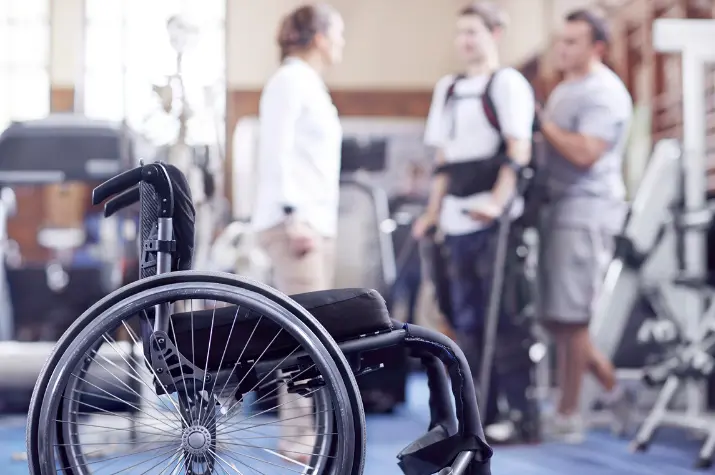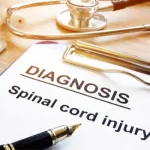
Sustaining a spinal cord injury can be a life-altering event, presenting significant challenges as you navigate through recovery and rehabilitation.
For instance, it may be over a year before you can participate in certain activities, such as walking or driving.
However, with the right approach and support system in place, it’s possible to achieve substantial progress and regain independence.
Understanding the Injury
Before delving into recovery strategies, you need to understand the nature of a spinal cord injury (SCI) and its implications. SCIs can result from trauma, such as car accidents, falls, or sports injuries, causing damage to the spinal cord and disrupting communication between the brain and the rest of the body.
The severity of the injury depends on factors like the location and extent of the damage, with outcomes ranging from temporary impairment to permanent paralysis. It’s important to note that immediate medical attention is critical in minimizing long-term complications and maximizing recovery potential.
Additionally, ongoing research and advancements in medical technology continue to improve treatment options and prognosis for individuals with spinal cord injuries.
Medical Treatment and Rehabilitation

Upon sustaining a spinal cord injury, seeking prompt medical attention is essential to prevent further damage and optimize recovery outcomes. Treatment often begins with stabilizing the spine and addressing any associated injuries through surgery or medication.
Following initial medical care, rehabilitation plays a crucial role in promoting recovery and enhancing functional abilities. This may involve physical therapy, occupational therapy, and other specialized interventions tailored to individual needs.
It’s vital to adhere to the rehabilitation regimen prescribed by healthcare professionals to maximize progress and regain independence.
Furthermore, maintaining open communication with your healthcare team can help address any concerns or adjustments needed throughout the recovery process.
Maintaining a Positive Mindset
Maintaining a positive mindset is paramount throughout the recovery journey, as it can significantly influence your outlook and motivation. While facing physical and emotional challenges is inevitable, focusing on small victories and progress milestones can help instill a sense of hope and resilience.
Surrounding yourself with supportive loved ones can provide encouragement and assistance during difficult times. Engaging in relaxation techniques, such as deep breathing exercises or mindfulness meditation, can also help manage stress and promote emotional well-being.
Moreover, speaking to a certified counselor or therapist can offer valuable insights and coping strategies for tougher days.
Adapting to Lifestyle Changes
Adjusting to lifestyle changes is an integral part of post-injury recovery, as you may need to modify your daily routines and environment to accommodate physical limitations. This may involve making changes to your home, such as installing ramps or grab bars, to enhance accessibility and safety.
Exploring assistive devices and adaptive technologies can facilitate independence and participation in various activities. Seeking guidance from occupational therapists or accessibility experts can provide valuable insights and recommendations tailored to your specific needs and living situation.
Staying informed about advancements in assistive technology can also help you take advantage of new tools and resources to improve your quality of life.
Nutrition and Physical Fitness

Maintaining proper nutrition and physical fitness are essential components of overall health and well-being, especially during the recovery process.
Consuming a balanced diet rich in nutrients can support tissue repair and boost energy levels, while regular exercise can help improve strength, flexibility, and cardiovascular health.
Working with a healthcare provider or nutritionist can help develop a personalized plan geared to your specific needs and goals.
It’s vital to stay hydrated by drinking an adequate amount of water throughout the day to support bodily functions and promote recovery.
Seeking Legal Guidance
In cases where the spinal cord injury results from negligence or wrongdoing, seeking legal guidance may be necessary to pursue compensation and ensure accountability.
For instance, consulting with a reputable California spinal cord injury lawyer can help you understand your rights and options for legal recourse. A skilled attorney can navigate complex legal proceedings on your behalf, advocating for fair compensation to cover medical expenses, lost wages, and other damages.
It’s important to gather and preserve evidence related to the injury, such as medical records, accident reports, and witness statements, to strengthen your case.
Building a Support Network
Building a strong support network is critical for emotional support and practical assistance throughout the recovery process. Connecting with other individuals who have experienced spinal cord injuries can provide valuable insights, empathy, and camaraderie.
Additionally, joining support groups or participating in peer mentoring programs can offer encouragement, guidance, and a sense of community. It’s beneficial to involve family members and close friends in your support network to provide ongoing emotional support and assistance with daily activities.
Furthermore, accessing online forums and social media groups dedicated to spinal cord injury recovery can expand your support network and provide access to a wealth of shared experiences and resources.
Embracing Adaptive Activities
Exploring adaptive activities and recreational pursuits can enhance your quality of life and foster a sense of fulfillment after a spinal cord injury.
Whether it’s adaptive sports, artistic endeavors, or leisurely hobbies, finding activities that align with your interests and abilities can promote physical and psychological well-being.
Engaging in meaningful pursuits can also help cultivate a sense of identity beyond the injury. Participating in community events or volunteering opportunities can provide a sense of purpose and connection to others.
Conclusion
Recovering from a spinal cord injury is a multifaceted journey that requires patience, perseverance, and support. It’s important to celebrate progress, no matter how small, and to remain adaptable in the face of setbacks or obstacles.
While challenges may arise along the way, resilience and determination can ultimately lead to a fulfilling and rewarding life after experiencing a spinal cord injury.
About The Author:
Stacey Smith is a freelance health writer. She is passionate about writing about women’s health, dental health, diabetes, endocrinology, and nutrition and provides in-depth features on the latest health news for medical clinics and health magazines.




